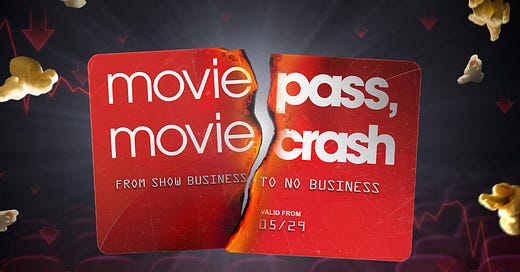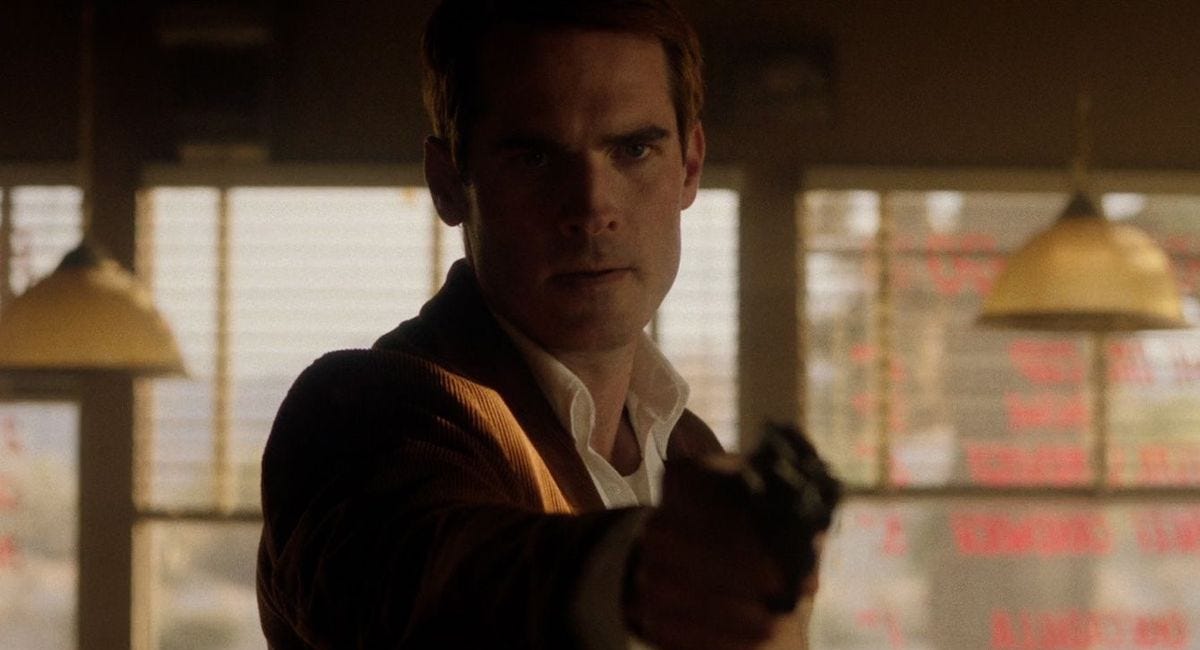In his newsletter this week, JVL wrote about a new documentary about MoviePass—a company that offered moviegoers unlimited movie tickets for the low-low price of $9.99 a month, only to lose gobs of money and collapse in on itself in the most obviously spectacular way possible—and the way it represented a weird moment in the American economic landscape.
As JVL notes, MoviePass was the dumbest possible representation of something that came to be known as the millennial lifestyle subsidy, in which middle-class urbanites were able to live like upper-class urbanites because their car services (like Uber) and food acquisition services (like Grubhub and Instacart and Doordash) were subsidized by gobs of VC money. Way back in 2019, Derek Thompson noted this was all going to come crashing down, and sure enough it did. And, equally sure enough, the middle-to-upper-middle-class segment of the population that had gotten used to having cheap, iPhone-dispatched servants to aid them got annoyed when those servants no longer came cheap.
As I said, MoviePass was the dumbest possible representation of this ideal, because it offered something that was so obviously too good to be true—a ticket a day to the movie theater for the monthly price of less than one ticket—and the guys running the company thought they could make up the losses by losing even more money by acquiring even more customers draining them of cash. At one point in MoviePass, MovieCrash we get a glimpse of the company’s securities filing and see it has lost $150 million in 2017 and was on track to lose much more than that in 2018. The bottom fell out, the company likely committed some light fraud to keep the lights on for a few more days, and eventually cratered entirely.
MoviePass, MovieCrash is oddly structured; director Muta’ali attempts to craft a narrative that MoviePass was a good company run by two idealistic African-American movie fans and they got forced out for a couple of evil white guys who ran the thing into the ground. Okay, but: MoviePass wasn’t a particularly good business to begin with? The reason they had to bring in those two evil venture capital dudes is that the company was a money-loser even at a higher cost (I believe New Yorkers were paying up to $50 a month, depending on the plan).
The biggest problem is that the film takes forever to highlight the simple foundational flaw of MoviePass’s plan: the company was literally just sending people debit cards that they would fill with the full price of a movie ticket when customers got to theaters. You don’t have to graduate from the London School of Economics to see the flaw in this plan: if you’re simply covering the full cost of a movie ticket, but charging people less than the retail cost of the movie tickets they want to sign up for the service, you’re never going to make money. You can lose money slowly or quickly that way, but you’re going to lose money.
Now, MoviePass hoped to demonstrate to chains that their app was such a useful tool that they’d want to help MoviePass out by cutting them in on concession sales or offering discounts for tickets. And maybe that would’ve worked out in the long run!1 But the more likely result was always that MoviePass’s status as pure middleman would doom it to failure.
And it was doomed to failure because if it was a good idea, the exhibitors would simply copy it and do their own version of it. If you understand how movie ticket sales work, it makes perfect sense why they would do this: If you spend $10 on a ticket, $5 of that goes to the studio that made the movie, $5 goes to the theater.2 So when MoviePass put $10 in your debit card, it cost the company $10 per ticket. But if, say, AMC lets you into a movie, it’s only losing $5 per ticket. So if you’re paying $20/month to see unlimited movies, the plan is basically profitable for AMC until you hit four tickets a month.
But the real goal is to get you in the theater, period, in the hopes that the “free” ticket you just scanned opens up your wallet in other ways. Maybe you buy a beer at MacGuffins. Maybe you get an Icee and refill it once or twice instead. Perhaps you go for the classic popcorn-and-soda combo. Concessions are where theaters make their money. And while I don’t have any data on this, I would be willing to wager that customers who don’t shell out for a ticket at the ticket booth are more likely to splurge a little on concessions.
Maybe. Maybe not. The Season Pass concept certainly wasn’t enough to save the Alamo Drafthouses in my area. If theaters are going to survive, something has to change, and a MoviePass-style subscription service is as good a change as any to attempt.
On Across the Movie Aisle this week we reviewed a movie most folks haven’t seen yet, The Last Stop in Yuma County. Here’s hoping our raves will give you listeners a reason to check it out. We also suggested, politely, that you stop filming Chipotle workers making your burritos, you filthy savages. No one wants to live in a the guacopticon. (I’m still workshopping this portmanteau.)
Links!
On the bonus episode of ATMA this week, we talked nepo-babies and why people really shouldn’t freak out about Hollywood dynasties. If you want to listen but aren’t a paying member of Bulwark+, you can get a month free by clicking the button below:
This week I reviewed Hit Man, which may end up being the last movie I saw at my local Drafthouse. The fact that several orders of magnitude more people will watch it on Netflix this weekend than ever saw it in theaters goes a long way toward explaining just why the theater closed, I guess.
Regarding the Drafthouse’s closure, a few folks have asked me what this means for Season Plan holders in the DFW region. I reached out to the people handling press for Alamo and will update this space if I hear anything.
Roy Price’s essay on studios losing touch with audiences is a must-read.
Kevin Costner’s upcoming Horizon: An American Saga — Chapter One is tracking for a $12M opening, which means you need to start telling all the Yellowstone-heads out there about Horizon: An American Saga — Chapter One. We are gonna open this movie, people. Tell a friend.
Assigned Viewing: Frank Miller, American Genius (Cinemark)
Usually, I assign something that’s streaming or otherwise accessible via home video. I’m going a slightly different route today and highlighting a picture that’s playing for one night only on a limited number of screens. It’s not going to be for everyone, but if you grew up reading the work of Frank Miller and the other great comic book artists of the 1980s, this movie is going to be a real treat for you: it’s fair to say that Miller’s ideas and aesthetic have more or less defined how comic books have looked and felt over the last few decades, and that look and feel has bled over into the world of movies.
The movie’s playing June 10, and features a livestreamed introduction moderated by Rosario Dawson (who starred in the big screen adaptation of Miller’s Sin City and Sin City: A Dame to Kill For). It’s showing in Cinemarks across the country, and those in attendance will receive a free collectible. (Find a theater near you here.) If you’re at all a fan of Miller’s work, I highly recommend checking the documentary out: There’s nothing hugely revelatory here, but it’s a nice celebration filled with names and faces you’re likely to recognize if you are steeped in Miller’s era of comic book history.
Indeed, founder and CEO Stacy Spikes claims that the service is now profitable thanks to its AI-run system of allocating credits to nudge people toward discounted weekday and matinee showings rather than more expensive weekend and evening showings. I would be … curious to get a look at the real numbers here, but this does at least sound like a better, more useful version of the system than was initially sold, for customers looking for deals and theaters looking to maximize attendance alike. That said, I still don’t quite understand how it can be profitable unless MoviePass is getting a discount for buying unused matinee tickets in bulk, or something?
MORE OR LESS, don’t yell at me about opening weekend splits, Disney’s percentages, etc., I understand it’s not a pure 50/50 split, I’m making a general point.








On a totally unrelated note, I feel like two of my hobbies have collided - the Modern Quilt Guild has produced a quilt pattern called "Sunny Bunch". Every time I see it, it makes me smile.
https://www.themodernquiltguild.com/resource/sunny-bunch/
The Dallas Drafthouse news really sucks.
Also, the portmanteau you're looking for is "panopticon carne."